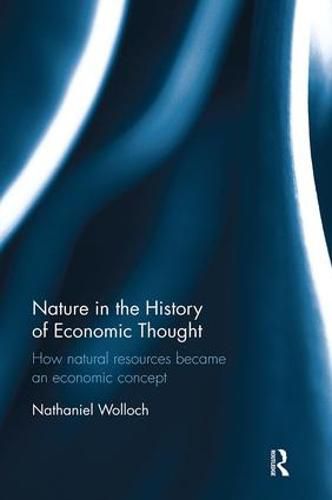Readings Newsletter
Become a Readings Member to make your shopping experience even easier.
Sign in or sign up for free!
You’re not far away from qualifying for FREE standard shipping within Australia
You’ve qualified for FREE standard shipping within Australia
The cart is loading…






From antiquity to our own time those interested in political economy have with almost no exceptions regarded the natural physical environment as a resource meant for human use. Focusing on the period 1600-1850, and paying particular attention to major figures including Adam Smith, T.R. Malthus, David Ricardo and J.S. Mill, this book provides a detailed overview of the intellectual history of the economic consideration of nature from antiquity to modern times. It shows how even someone like Mill, who was clearly influenced by romantic notions regarding the spiritual need for contact with pristine nature, ultimately regarded it as an economic resource. Building on existing scholarship, this study demonstrates how the rise of modern sensitivity to nature, from the late eighteenth century in particular, was in fact a dialectical reaction to the growing distance of modern urban civilization from the natural environment. As such, the book offers an unprecedentedly detailed overview of the intellectual history of economic considerations of nature, whilst underlining how the history of this topic has been remarkably consistent.
$9.00 standard shipping within Australia
FREE standard shipping within Australia for orders over $100.00
Express & International shipping calculated at checkout
From antiquity to our own time those interested in political economy have with almost no exceptions regarded the natural physical environment as a resource meant for human use. Focusing on the period 1600-1850, and paying particular attention to major figures including Adam Smith, T.R. Malthus, David Ricardo and J.S. Mill, this book provides a detailed overview of the intellectual history of the economic consideration of nature from antiquity to modern times. It shows how even someone like Mill, who was clearly influenced by romantic notions regarding the spiritual need for contact with pristine nature, ultimately regarded it as an economic resource. Building on existing scholarship, this study demonstrates how the rise of modern sensitivity to nature, from the late eighteenth century in particular, was in fact a dialectical reaction to the growing distance of modern urban civilization from the natural environment. As such, the book offers an unprecedentedly detailed overview of the intellectual history of economic considerations of nature, whilst underlining how the history of this topic has been remarkably consistent.